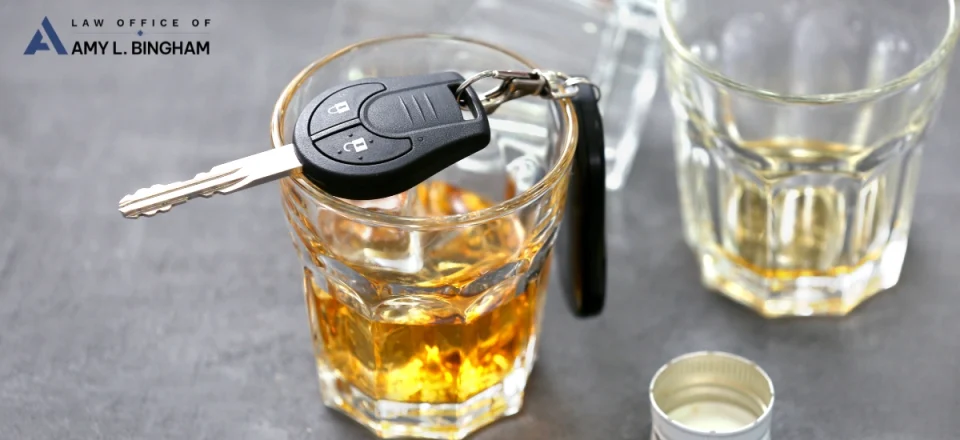A: No, in Oregon, you can’t be charged with both DUI and DWI at the same time — for the same incident — because these charges are based on different standards. DUI is for impairment without blood alcohol testing, while DWI applies when your blood alcohol content (BAC) is 0.08% or higher. The law treats them as mutually exclusive, so only one charge can apply per incident.
DUI vs DWI in Oregon: What’s the Difference? 2025

It’s not uncommon to see the terms DUI and DWI used interchangeably. However, these are two very different charges, and there are important distinctions between them. Knowing how DUI vs DWI in Oregon differs can affect the way your case is handled and can even influence the penalties you could be facing.
What Is a DUI in Oregon?
In Oregon, a DUI, or Driving Under the Influence, means that someone operated a vehicle while their ability to drive was affected by either alcohol, drugs, or both. In addition, being charged with a DUI isn’t tied to a blood alcohol test (BAC), so even a slight decline in your coordination, reaction time, or decision-making can be enough for law enforcement to make the determination.
You might feel mostly fine or think you’re okay to drive, but if your ability to respond quickly, stay focused, or make safe choices on the road is even mildly affected, that’s all it takes.
The law doesn’t just cover alcohol and illegal drugs. If they have an adverse effect on your ability to drive, it also covers prescription medications and even some over-the-counter medicines.
What Is a DWI in Oregon?
DWI stands for Driving While Intoxicated, and in Oregon, it specifically refers to cases where a driver’s blood alcohol concentration (BAC) is 0.08% or higher. Unlike a DUI, which focuses on how impaired someone seems regardless of their BAC, a DWI is purely based on that number.
So, even if you appear to be driving fine and can possibly pass a field sobriety test, if a breath or blood test shows a BAC of 0.08% or more, you can still be charged. Because it’s tied to a clear, measurable limit, DWIs are treated more strictly, and they often come with tougher penalties.
How Oregon Defines “Impairment”
Oregon law takes a broad view when it comes to the definition of being impaired behind the wheel. The law defines impairment as any noticeable effect that alcohol, drugs, or a combination of both has had on your ability to operate a vehicle.
This means you don’t have to be stumbling drunk or obviously high to be charged.
You can be considered impaired if your coordination is off, if your reaction time is slowed, or if your judgment is affected in a way that makes driving risky. For example, if you miss traffic signals, drift between lanes, brake too late, or seem confused during a traffic stop, an officer could determine that your driving is impaired.
The key point is this: it’s not about how much you drank or whether you feel “fine.” It’s about how your behavior and your ability to drive are affected. If an officer believes you’re not in full control of your physical or mental faculties because of any substance, you can be charged with DUI based on that observation alone. If you’re facing a DUI or DWI charge and feeling uncertain about your next steps, don’t wait—contact the Law Office of Amy L. Bingham immediately for urgent legal support and strong defense.
Consequences of DUI and DWI in Oregon
In 2022, over 42,500 Americans died in alcohol and/or drug-related accidents, and in 2020, Oregon alone recorded 252 such incidents.
That’s why the state takes DUI and DWI so seriously. Both charges are considered criminal offenses, which can lead to a mix of legal, financial, and personal penalties.
For a first-time offense, you might face jail time, a hefty fine, a suspension of your driver’s license, and mandatory participation in a drug or alcohol treatment program. You’ll also likely be required to install an ignition interlock device (IID) in your vehicle, which lowers the rate of repeat offenses by 70%.
If it’s a second or third offense, the penalties increase sharply. You could face longer jail time, a longer license suspension (in some cases, permanent revocation), higher fines, and additional treatment or education requirements. The court and DMV take repeat offenses very seriously.
A DUI or DWI conviction can also have an impact on your life beyond the courtroom. It can raise your insurance rates, limit your job opportunities — especially if driving is part of your work — and damage your reputation.
Beyond these challenges, a conviction can also mean losing your driving privileges for an extended period, being required to install an ignition interlock device, and completing mandatory treatment or education programs. Repeat offenses bring even harsher penalties, such as longer license suspensions, higher fines, and possible jail time. These consequences can disrupt your daily life and future plans. If you’re facing DUI or DWI charges, contact knowledgeable DUI lawyer Amy L. Bingham for experienced guidance and dedicated defense
FAQs
Take the Next Step with Confidence
If you’re facing a DUI or DWI charge in Oregon, understanding the differences and how the law applies can make or break your case. The legal process can feel overwhelming, but at The Law Office of Amy L. Bingham, our team is ready to provide clear answers and guidance tailored to your unique situation.
Copyright © 2026 Law Office of Amy L. Bingham. All Rights Reserved. Disclaimer | Site Map | Privacy Policy

